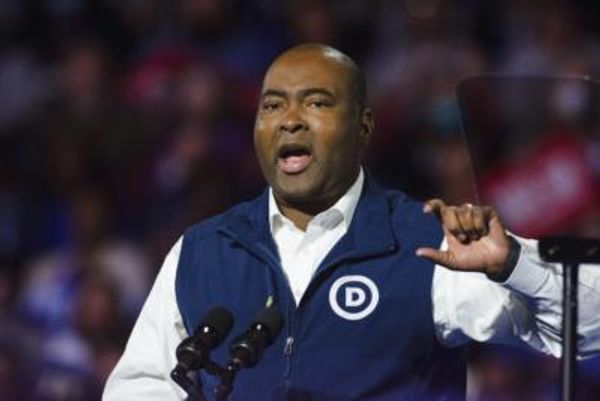WASHINGTON _ Influential conservative groups that have long been a thorn in the side of the Republican establishment are turning their focus to taking back the House in 2020 rather than pursuing primary challenges to GOP senators they view as too moderate.
Club for Growth and FreedomWorks, two Washington-based conservative groups that "score" lawmakers' votes and punish or reward them accordingly, told McClatchy they are directing their resources to pushing conservative candidates in open House Republican seats, as well as winning Democratic-held districts that President Donald Trump carried in 2016.
The leaders of the two groups said they currently don't have any plans to field challengers or run advertisements opposing any GOP senators, who are preparing to take a series of consequential impeachment votes.
"We don't have any plans to spend against any of the moderate Republican senators," said Adam Brandon, president of FreedomWorks.
He said the group "at this point" also doesn't plan to field primary challengers against them. "The only thing that would change my mind is if we viewed it as a great challenger who had a very competitive plan and a path to victory. I do not see that happening right now," he said.
The shift in focus could take some pressure off Senate Republicans who are being closely watched for signs of party defection in an impeachment trial _ vulnerable 2020 incumbents including North Carolina's Thom Tillis, Colorado's Cory Gardner, Iowa's Joni Ernst, Arizona's Martha McSally and Maine's Susan Collins.
Club for Growth President David McIntosh predicted senators will fall in line, rendering any need for primary challengers unnecessary.
"All of them will use impeachment as a way to shore up their Republican base, and then pivot as they get into the general election on other issues," he said.
Referring to Collins, who is seen as the most vulnerable of the group, McIntosh said he trusted "she'll do the right thing."
Collins and others have signaled they disagree with how Democrats handled Trump's impeachment inquiry in the House, and they are unlikely to vote to remove the president from office in the Senate.
They have not, however, committed to how they will vote on expected Democratic motions to compel witness testimony and submission of documents that could hurt Trump.
In previous years, Republicans who broke ranks with the party on major issues risked alienating far-right outside groups to the point where those groups fielded _ and funded _ primary challengers.
In this year's election, some conservative groups have decided it is more important to spend their money on House races in hopes of regaining control of the chamber, rather than support primary challengers to Republican incumbents and put the GOP's already fragile Senate majority at risk.
Activist groups have helped fund GOP primary upsets in the previous years, such as when they helped Sen. Mike Lee, R-Utah, overtake then-incumbent Robert Bennett and win the seat in 2010.
At the same time, these groups have seen the danger in fielding candidates who are popular with the primary election base but don't have broad enough appeal to compete in the general election.
Tea party-backed Republican candidate Richard Mourdock in 2012, for instance, defeated incumbent Sen. Richard Lugar but ultimately lost to Democrat Joe Donnelly.
Outside conservative groups also have a mixed track record in picking successful primary candidates from the start. Activists spent thousands of dollars trying to defeat then-Sen. Thad Cochran, R-Miss., but challenger Chris McDaniel lost.
And while their choice, Joe Miller, ran on the Republican ticket in a 2010 Alaska Senate race, incumbent Lisa Murkowski was able to retain her seat through a successful write-in campaign.
Amy Kremer, who chaired the Tea Party Express in 2010 when it spent nearly $600,000 as part of that effort to bring down Murkowski, said she wouldn't take that same approach now.
"There has been a time for purity tests and what not," said Kremer, who now runs two political committees focused on winning the House and the presidency. "At this point in time, we need to hang on to the House and the Senate."
It appears most of the vulnerable Senate Republicans have fallen in line behind the president and the party.
Senate Majority Leader Mitch McConnell, R-Ky., announced last week he secured the votes of at least 51 of the 53 Senate Republicans necessary to approve a rules package that would govern an impeachment trial without an upfront agreement to hear from witnesses.
Democrats still see room to put Republicans in a bind on impeachment trial proceedings. Senate Democratic leader Chuck Schumer of New York pledged he would force Republicans to vote at some point to allow witness testimony.
"We are telling our Republican colleagues, 'you can run, but you can't hide,'" Schumer said at a news conference. "We will not let them avoid the vote. They can delay it. They can't avoid it."
Democrats are also prepared to spend money calling attention to Republicans who are standing by McConnell. The Democratic Senatorial Campaign Committee has even launched a new website contrasting Collins' views on President Bill Clinton's impeachment with Trump's proceedings.
But in asking Republicans to break from their party, Democrats are also taking something of a risk. In recent weeks, a major component of their political messaging has been accusing Republicans of blind party loyalty and hypocrisy on impeachment. If some Republicans buck their leadership, Democrats could see their pressure campaign backfire.
Brian Fallon, executive director of Demand Justice _ a left-leaning group focused on the courts that has plans to spend heavily against Republicans this election cycle _ agreed that voting to allow witness testimony at the impeachment trial would be an easy way for vulnerable Republican senators to show their independence to constituents.
In the meantime, as GOP senators weigh their options in Washington against the political dynamics in their home states, some 2020 incumbents have more flexibility than others.
In North Carolina, for instance, the window to file as a Senate candidate has closed, meaning Tillis is no longer at risk of a primary challenge _ though his past efforts to distance himself from Trump made him vulnerable at one time.
One potential primary challenger, businessman Garland Tucker, dropped out of the race at the last minute. McIntosh of Club for Growth told McClatchy the group might have put money behind retiring Rep. Mark Walker, R-N.C., had the staunch Trump ally decided to run against Tillis.
"He still has to work pretty hard to get the Trump loyalists back in favor of him," said McIntosh of the incumbent senator.
Collins could still get a more conservative challenger, with the filing deadline in Maine not until March 16. But she is not being targeted financially, at the moment, by top conservative activists.
"If anything, I would help Susan Collins, because we need to hold onto that seat," Kremer said.
Collins' decision to cast a decisive vote to confirm embattled Supreme Court Justice Brett Kavanaugh in 2018 also changed her political landscape.
That vote galvanized Democratic efforts to unseat her in 2020. "When Republicans need her vote, she is there for her party leaders," DSCC press secretary Stewart Boss said of Collins' tendency to vote for Trump's controversial judicial appointments.
Her vote for Kavanaugh impressed conservatives who are now inclined to forgive any breaking with the party on the procedural votes related to impeachment. "Susan Collins, she's one of our worst voters," said Brandon of FreedomWorks, "but you know what, she proved to be a key vote for Kavanaugh, so we'll let her do her thing out there."
Sen. Todd Young, R-Ind., the chairman of the National Republican Senatorial Committee, said in an interview he wasn't worried about Republicans breaking with the party on impeachment votes.
"Look, I think, with very few exceptions, the vast majority of American people are fair minded people and they want every member to review the evidence before them and to act as they deem appropriate."







